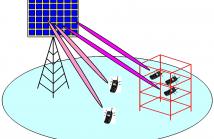- Read more about Power Scaling Laws for Massive MIMO Relay Systems with Linear Transceivers
- Log in to post comments
Power Scaling Laws for Massive MIMO Relay Systems with Linear Transceivers
- Categories:
 11 Views
11 Views- Read more about DoA Estimation and Capacity Analysis for 3D Massive-MIMO/FD-MIMO OFDM System
- Log in to post comments
- Categories:
 14 Views
14 Views- Read more about Decentralized Coordinated Beamforming for Weighted Sum Energy Efficiency Maximization in Multi-Cell MISO Downlink
- Log in to post comments
We study energy-efficient decentralized coordinated beamforming in multi-cell multiuser multiple-input single-output system. The problem of interest is to maximize the weighted sum energy efficiency subject to user-specific quality of service constraints. The original problem is iteratively approximated as a convex program according to successive convex approximation (SCA) principle. The convex problem at each iteration is then formulated as a general global
- Categories:
 16 Views
16 Views- Read more about Data rate maximization based power allocation for OFDM System in a High-Speed Train Environment
- Log in to post comments
- Categories:
 27 Views
27 Views- Read more about Iterative Optimization for Max-Min SINR in Dense Small-Cell Multiuser MISO SWIPT System
- Log in to post comments
Considering a dense small-cell network with simultaneous wireless information and power transfer (SWIPT), this work jointly designs transmit beamformers at the base stations (BSs) and receive power splitting ratios at the users (UEs). Our objectives is to maximize the minimum UE signal-to-interference-plus-noise-ratio (SINR) under BS transmit power and UE minimum harvested energy constraints. This problem is highly nonconvex, for which semidefinite programming (SDP) relaxation may even fail to locate a feasible solution.
GSIP_v1.pdf
- Categories:
 40 Views
40 Views
- Read more about Artificial-Noise Aided Transmit Design for Multi-User MISO Systems with Integrated Services
- Log in to post comments
This paper considers an optimal artificial noise (AN)-aided transmit design for multi-user MISO systems in the eyes of service integration. Specifically, we combine two sorts of services, and serve them simultaneously: one multicast message intended for all receivers and one confidential message intended for only one receiver. The confidential message is kept perfectly secure from all the unauthorized receivers.
- Categories:
 22 Views
22 Views
- Read more about DOA Estimation and Achievable Rate Analysis for 3D Massive MIMO in Aeronautical Communication Systems
- Log in to post comments
These slides are about the mean-squared error (MSE) characterization of the direction of arrival (DOA) estimation. Also, we study the effect of MSE of DOA estimation on the achievable rate of the Massive MIMO system
- Categories:
 82 Views
82 Views- Read more about An Efficient CDI Acquisition Scheme Facilitating Large Scale Antenna systems
- Log in to post comments
- Categories:
 4 Views
4 Views